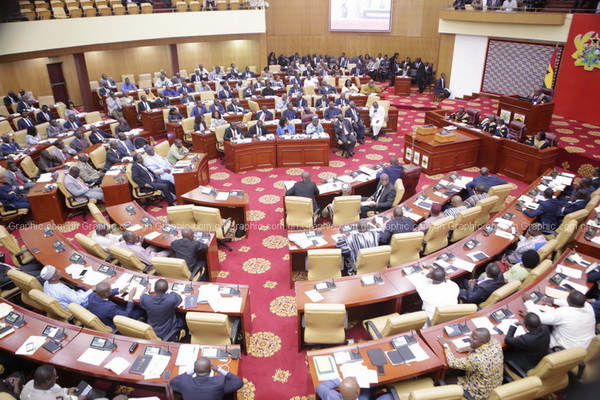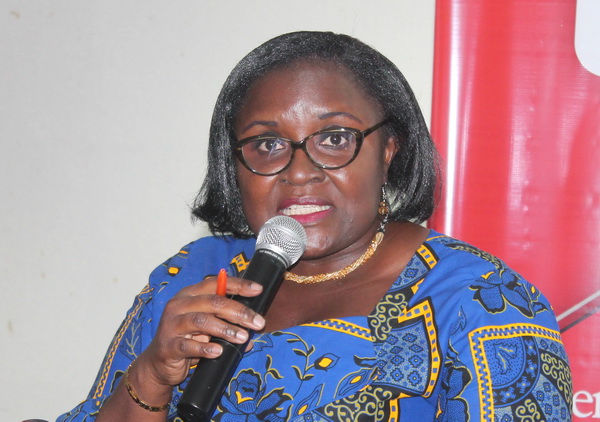
Majority, Minority disagree over latest perception index on corruption
Majority and Minority Members of Parliament (MPs) have slugged it out over the latest Corruption Perception Index (CPI) which has downgraded Ghana’s corruption perception.
The Minority MPs said the report was a reflection of the corruption in the country and an indictment on the government, which came to power on the back of promises to fight corruption.
But the Majority MPs said the report used 2015 and 2016 data and so the corruption perception rather pertained to the era of the erstwhile National Democratic Congress (NDC) government in 2015 and 2016.
The report, released by the local chapter of Transparency International, the Ghana Integrity Initiative (GII), indicated that Ghana had recorded the worst corruption perception score in the last six years after it was ranked 81 out of the 180 countries assessed in the 2017 Global CPI.
It scored Ghana 40 out of 100, the lowest in Ghana’s CPI scores since 2012 when CPI scores became comparable.
The report, which was released at a press conference last Wednesday, showed that Ghana’s performance dropped by three points from its 2016 score of 43, and seven points cumulatively from the 2015 score of 47.
According to the report, the 2017 CPI used nine out of the 13 data sources of independent institutions with high level of credibility to compute the index for Ghana and it showed that an average score of less than 50, which is what Ghana had received for 2017, showed serious corruption in the country.
Minority blames government
Commenting on the report, the MP for Sagnarigu, Alhaji A.B.A. Fuseini, said the New Patriotic Party (NPP) government had been botched with a lot of corruption cases since coming to power last year.
He said the reported diversion of five million litres of contaminated fuel at the Bulk Oil Storage and Transportation (BOST) Company Limited, the corruption allegation against the two Deputy Chiefs of Staff, Mr Abu Jinapor and Mr Francis Asenso-Okyere, and the hazy manner in which the Minister of Finance, Mr Ken Ofori-Atta, had issued the bonds were some of the cases of corruption that were not dealt with by the government.
He said corruption in government was not a perception but a real occurrence now.
“The corruption in the government is unbearable. The report is a reflection of the reality that corruption has hit the roofs,” he said.
Sharing his perspectives on the issue, the MP for Sene West, Mr Twumasi Kwame Ampofo, said the continued perpetuation of corruption in the country was due to the failure of the authorities to sanction offenders.
“Really there is corruption going on in the country, but no sanction. There is no smoke without fire and we need to trap the smoke,” he said.
He said since the President said he wanted to fight corruption, he should not take the report lightly.
He said the President should investigate all cases of corruption and bring the culprits to book.
Majority MPs reject accusation
The MP for Assin South, Rev. John Ntim Fordjour, said the report was rather an indictment on the erstwhile NDC government, since the technical note of the report indicated that the data used from nine out of the 13 data sources of independent institutions were for 2015 and 2016.
Therefore, anyone who claimed that the CPI report pointed to an increase in corruption in the country last year was doing so out of ignorance or mischief, he said.
Rev. Fordjour said the current government should rather be commended for the steps taken to fight corruption and retrieve some money for state.
For instance, he said, last year the Auditor-General saved the country GH¢5.4 million that could have been released through fictitious claims, while the Public Procurement Authority (PPA) also saved the country about GH¢800 million by limiting sole sourcing and controlling restricted tendering of contracts.
Rev. Fordjour said the appointment of Mr Martin Amidu as the Special Prosecutor was a giant step by President Nana Addo Dankwa Akufo-Addo in the fight against corruption.
For his part, the MP for Mpohor, Mr Alex Kofi Agyekum, said he did not expect corruption perception to go down, since the previous government had not taken any steps, since 2013, to fight corruption.
Therefore, he said, the increase in corruption perception in the country was the result of the porous system that the government had inherited.
He said corruption was like a cartel and indicated that the government was now working to overhaul the system.

The allegations
In spite of Ghana’s numerous efforts at fighting corruption, the CPI indicated that Ghana’s score of 40 points was a likely reflection of the inadequate investigations, prosecutions and sanctioning of corruption during the period the nine data sources covered, that is, 2016 (two data sources) and 2017 (seven data sources).
"It is important to remind ourselves of the plethora of corruption exposés during the period in question which might have influenced the perception of the respondents to the surveys, as well as the business experts — examples include the 2016 election-related corruption issues, the bus branding scandal, the Ghana Standards Authority $1.2m corruption scandal, the Central Medical Stores arson saga, the National Lottery Authority bribery and numerous adverse findings in the annual audit reports on the public sector," the statement accompanying the current index stated.
The current government, which is only a year and a few months in office, has been accused of alleged corruption, including perceived corruption in the government’s handling of the Ameri Power deal and cronyism in one of the government’s bond issues.
The President has, however, pledged his commitment to fight corruption and has appointed Mr Martin Amidu as the Special Prosecutor to deal with corruption.
Africa’s performance
Although Ghana performed below 11 other sub-Saharan African countries, including Lesotho, 42, and Burkina Faso, 42, it did better than 36 other sub-Saharan African countries, including Benin, 39; Swaziland, 38; Zambia, 37; and Tanzania, 36.
New Zealand and Denmark were ranked highest with scores of 89 and 88, respectively.
Syria, South Sudan and Somalia ranked lowest with scores of 14, 12 and nine, respectively.
Ghana’s previous performance
In the 2016 CPI ranking, Ghana dropped four percentage points, scoring 43 out of a score of 100, from its 2015 score of 47 points.
Out of the 176 countries that were assessed, Ghana was ranked 70th, performing worse than countries such as Rwanda, Namibia and Senegal in the 2016 report.
In 2012, however, Ghana scored 45 points out of 100; 46 in 2013 and 48 in 2014.
The CPI ranks countries and territories based on how corrupt their public sector is perceived to be.
A country or a territory’s score indicates the perceived level of public sector corruption on a scale of 0 (highly corrupt) to 100 (very clean).
Recommendations
In its recommendations, the GII urged the government to demonstrate a more practical commitment to fight corruption by enacting key legislation, such as the Right to Information (RTI), Witness Protection and the Conduct of Public Officer’s Bill.
“The newly created Office of the Special Prosecutor, together with anti-corruption institutions such as the Commission on Human Rights and Administrative Justice (CHRAJ), should be adequately resourced and the government and businesses must do more to encourage an open and engaged civil society,” it urged.
It further recommended that civil society should continue to hold political and institutional leadership accountable and citizens should report corruption when they became victims and witnesses of same, as prescribed by the National Anti-Corruption Action Plan (NACAP).
Ghana must prioritise the mainstreaming of anti-corruption measures into the 17 UN Sustainable Development Goals (SDGs), it said, in order to achieve the target of substantially reducing bribery and corruption by 2030.
The Executive Secretary of the Ghana Anti-Corruption Coalition, Mrs Betty Emefa Narteh, in her submission, said Ghana’s performance indicated that much was still not being done to fight corruption.
She said it was not enough to appoint the Special Prosecutor, saying that “we need to tackle corruption through a holistic approach with effective and efficient systems in place”.
Although she acknowledged some initiatives by the government to deal with corruption, she pointed out that the government had not addressed some alleged corruption cases.
Mrs Narteh further said the report was a wake-up call for the government to ensure that the Special Prosecutor was well resourced to execute his mandate.
The Executive Director of IMANI Ghana, Franklin Cudjoe, said the report was unfortunate, since it did not augur well for building investors’ confidence in the country.
“It shows how we have talked more about corruption rather than fixing it; we have to do everything in our power to build the perception,” he stated.
